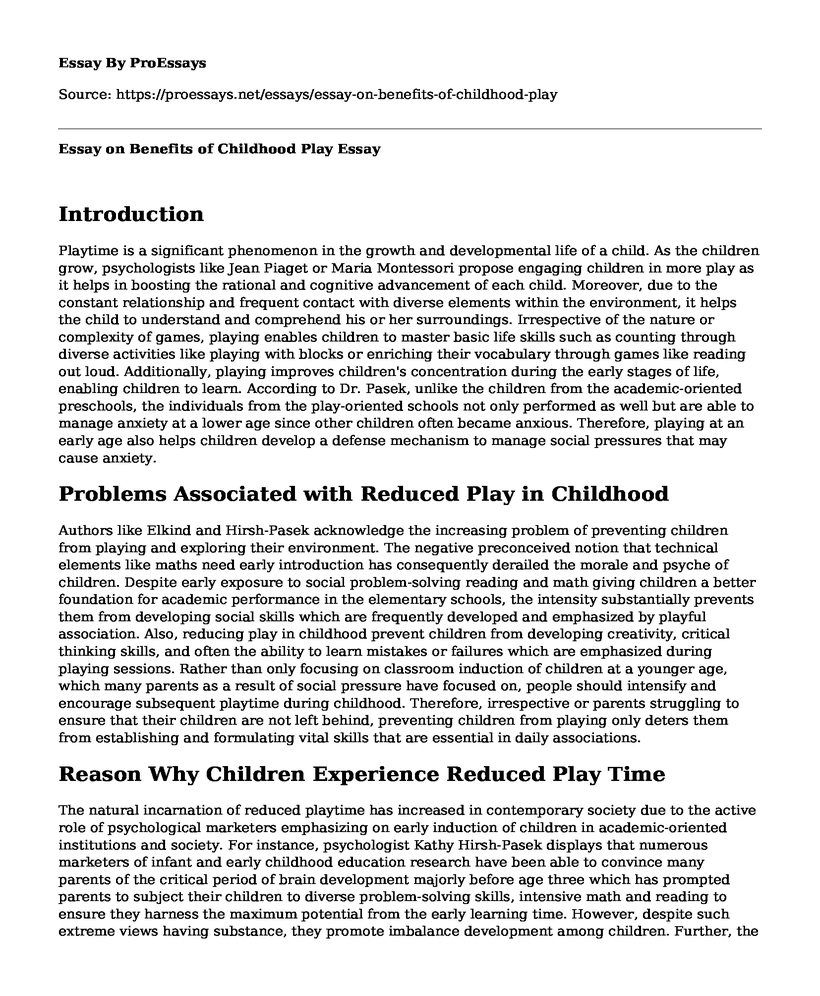Introduction
Playtime is a significant phenomenon in the growth and developmental life of a child. As the children grow, psychologists like Jean Piaget or Maria Montessori propose engaging children in more play as it helps in boosting the rational and cognitive advancement of each child. Moreover, due to the constant relationship and frequent contact with diverse elements within the environment, it helps the child to understand and comprehend his or her surroundings. Irrespective of the nature or complexity of games, playing enables children to master basic life skills such as counting through diverse activities like playing with blocks or enriching their vocabulary through games like reading out loud. Additionally, playing improves children's concentration during the early stages of life, enabling children to learn. According to Dr. Pasek, unlike the children from the academic-oriented preschools, the individuals from the play-oriented schools not only performed as well but are able to manage anxiety at a lower age since other children often became anxious. Therefore, playing at an early age also helps children develop a defense mechanism to manage social pressures that may cause anxiety.
Problems Associated with Reduced Play in Childhood
Authors like Elkind and Hirsh-Pasek acknowledge the increasing problem of preventing children from playing and exploring their environment. The negative preconceived notion that technical elements like maths need early introduction has consequently derailed the morale and psyche of children. Despite early exposure to social problem-solving reading and math giving children a better foundation for academic performance in the elementary schools, the intensity substantially prevents them from developing social skills which are frequently developed and emphasized by playful association. Also, reducing play in childhood prevent children from developing creativity, critical thinking skills, and often the ability to learn mistakes or failures which are emphasized during playing sessions. Rather than only focusing on classroom induction of children at a younger age, which many parents as a result of social pressure have focused on, people should intensify and encourage subsequent playtime during childhood. Therefore, irrespective or parents struggling to ensure that their children are not left behind, preventing children from playing only deters them from establishing and formulating vital skills that are essential in daily associations.
Reason Why Children Experience Reduced Play Time
The natural incarnation of reduced playtime has increased in contemporary society due to the active role of psychological marketers emphasizing on early induction of children in academic-oriented institutions and society. For instance, psychologist Kathy Hirsh-Pasek displays that numerous marketers of infant and early childhood education research have been able to convince many parents of the critical period of brain development majorly before age three which has prompted parents to subject their children to diverse problem-solving skills, intensive math and reading to ensure they harness the maximum potential from the early learning time. However, despite such extreme views having substance, they promote imbalance development among children. Further, the high risk of feeling left behind from the contemporary standards which emphasize early schooling and standardized testing has also greatly contributed to the reduced playtimes forcing children to focus more on reading right from kindergarten, a stage that was previously essential for developing social skills majorly through games. Therefore, contemporary social advancement and acute focus on academic performance at the expense of social skills regretfully resulted in reduced playtime among many children.
Cite this page
Essay on Benefits of Childhood Play. (2022, Mar 15). Retrieved from https://proessays.net/essays/essay-on-benefits-of-childhood-play
If you are the original author of this essay and no longer wish to have it published on the ProEssays website, please click below to request its removal:
- Essay Example: PowerPoint and a Student's Academic Performance in the Classroom
- Children's Online Privacy Protection Essay Example
- My Biggest Concern with the Lottery System - Essay Sample
- Kindergarteners' Understanding of the Five Senses - Research Paper
- Essay Sample on Schools' Safety: Securing Kids' Future from Intruders & Active Shooters
- Essay Example on Tutoring Students With ADHD: Challenges & Solutions
- Essay Example on Careful Planning: The Key to Excellent Teaching







